Analysing the attacking football produced during the group stage of EURO 2024
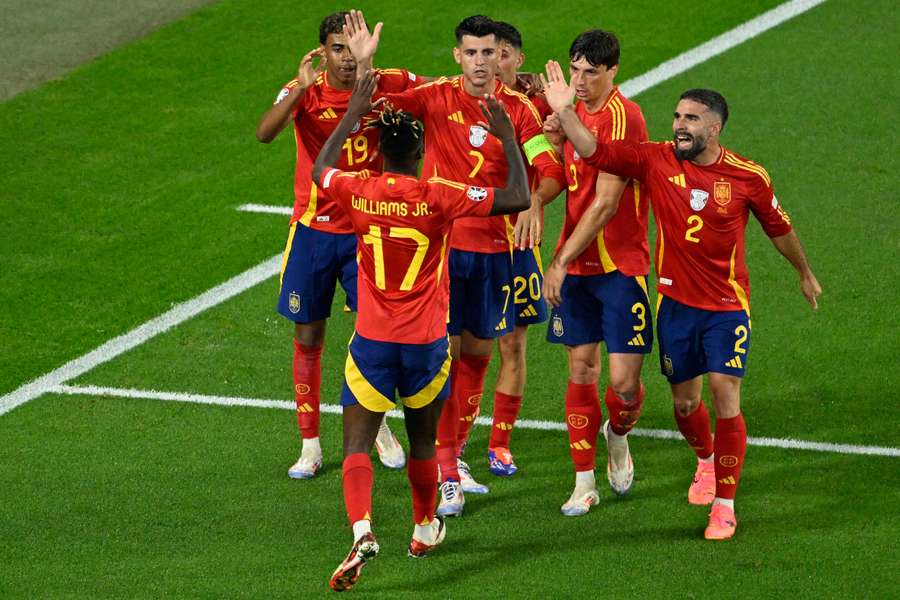
If football is the most popular sport in the world, it is largely because - unlike boxing for instance - you cannot lose due to inferiority alone. Nor is there a rule that you can be punished for passivity as is the case in handball. Everyone has the opportunity to compete while remaining true to their own creed, which often has its roots in the history and state of mind of an entire country, as demonstrated by Italian football's preference for catenaccio in the post-war period.
Disheartened by the Second World War and by the tragedy of the Grande Torino in the world of football, the Italian national team responded on the pitch with a defensive, pragmatic attitude that has not yet been completely erased. After all, it could not have been easy to play joyous football while a large part of your population had serious problems getting a hot (and, many times, cold) meal.
Similarly, without the Dutch raid on Catalonia, it would have been very difficult for Barcelona to create one of the most admired football schools on the planet, which also saw the Spanish national team dominate between 2008 and 2012. In that case, too, historical and social motivations played their part: the aim was to develop an alternative to the winning Real Madrid model and so just winning was no longer enough, it had to be done by playing well.
Not just catenaccio or tiki-taka
Fortunately, however, between catenaccio and tiki-taka there is a wide range of possibilities available to coaches all over the world, all of which, as we said, are legitimate, because while it is true that no one would dream of questioning Pep Guardiola's genius, it is equally true that one cannot help but believe Carlo Ancelotti's point of view is also valid when he assures us that "it is the coach who must adapt to the squad at his disposal and not vice versa".
And the truth is that in international football, with very few exceptions, managers follow the Ancelottian doctrine, while at the same time trying not to betray their country's traditions, even though in 2010, if it had not been for Iker Casillas' toe, it would have been the least traditionally Dutch Netherlands side in history that would have won the World Cup. We are sure the fans of Oranje would have been thrilled to celebrate the title despite Bert van Marwijk's substance-over-style team giving Johan Cruyff an ulcer.
And so we come to the European Championship in Germany, which has brought the curtain down on its group stage after 36 matches during which the teams in contention tried to assert their own football over that of the opponent.
The generous 24-team format only sent eight home, meaning that if you had four points, it was virtually impossible to be eliminated, and Slovenia - second to last in terms of shots (26), fourth to last in terms of attacking actions (86) and last in terms of ball possession (36.7%) - managed to survive with just three, knocking Hungary out of the competition on goal difference. It is precisely from here that comes the first food for thought in our analysis of the tactical attitude of the national teams involved in the European Championship.
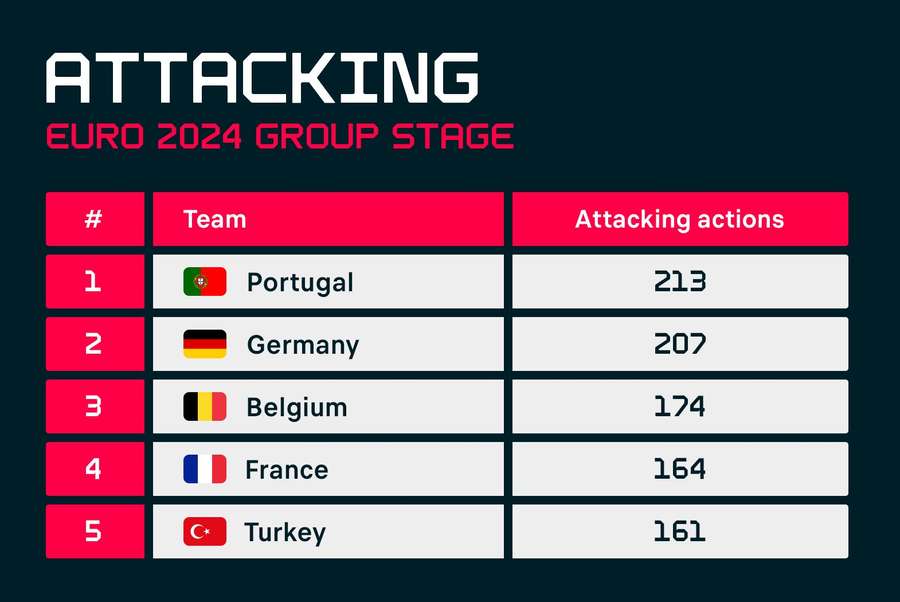
It was national teams such as Hungary itself and, above all, Ukraine who failed to limit the damage when they lost their matches; the latter were eliminated despite - or, perhaps, because of - being one of the most proactive sides at the tournament with 42 shots on goal (eighth overall), an 87.3 per cent pass accuracy (eleventh) and 130 total attacks (twelfth).
They paid the price for scoring just two goals, the same amount that was enough for Slovenia to get through despite having just 25 shots (second to last), 36.7% ball possession (last) and only 86 offensive actions (21st).
England and France run dry
Two goals were also enough for England to top their group and France to finish second in theirs. Despite a 90 per cent pass accuracy (second) and an average ball possession of 59.7 per cent (third), Southgate's national team managed to generate only 132 attacks (eighth) and just 28 total shots (20th) though.
Even worse were France, whose two goals came through an own goal and a penalty kick, despite them being among the teams that created the most offensive actions (164, fourth overall) with 49 total shots (fourth), 89.6% passing accuracy (fifth) and 54.3% ball possession (sixth).
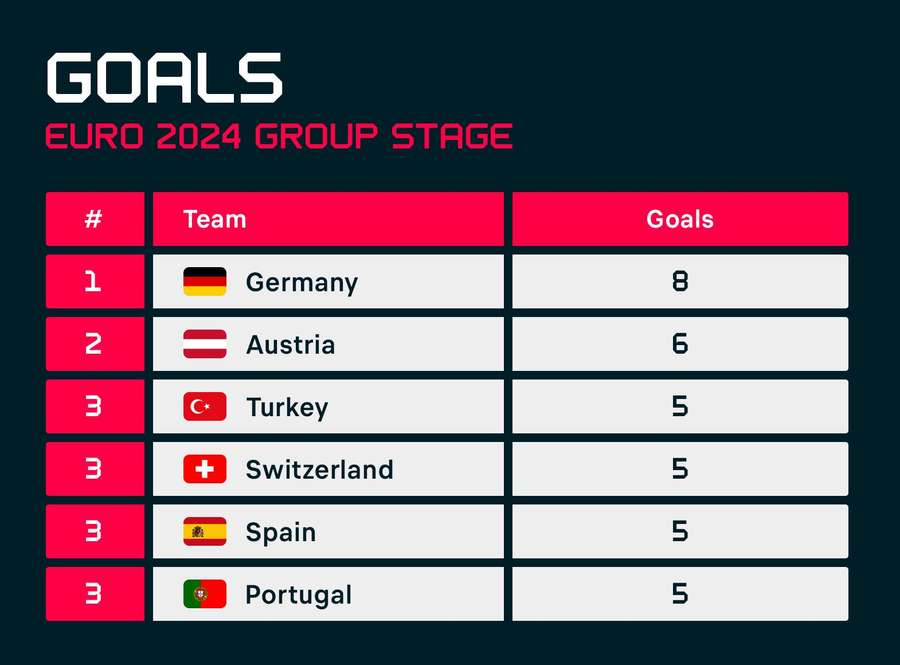
In terms of offensive production, the group stage leaves us with important numbers for Germany and Portugal. Nagelsmann's national team is, in fact, first in terms of goals scored (8), total shots (57), passing accuracy (93%) and ball possession (64.3%) and second in terms of offensive actions (207).
Ahead of the Germans in this latter aspect is Roberto Martinez's Portugal, who in turn are second in total shots (54), passing accuracy (90%) and joint first in ball possession (64.3%). Playing the last match, with qualification and first place acquired, with a lineup full of reserves has, however, dropped them to the third step of the podium for goals scored.
The Spanish anomaly
The national team that has probably impressed the most is Spain. How? Well, by giving up a lot of ball possession. Yes, even the Roja decided to adopt the Ancelotti approach, adapting to the men at their disposal.
De la Fuente's team are only seventh in both ball possession (54%) and attacking actions (148) although they have managed to maintain a 90% accuracy in passing (second), shoot 48 times (fifth) and score five goals (third).
This new tactical attitude allowed Spain to be the only team to finish with three wins out of three in the group stage, despite only fielding one of their unquestionable starters (Laporte) in the last match. In short, De la Fuente's secret is that he has succeeded in assembling a first-class squad - betting heavily on the verticality of Nico Williams and Lamine Yamal - for which he has tailor-made a system for.
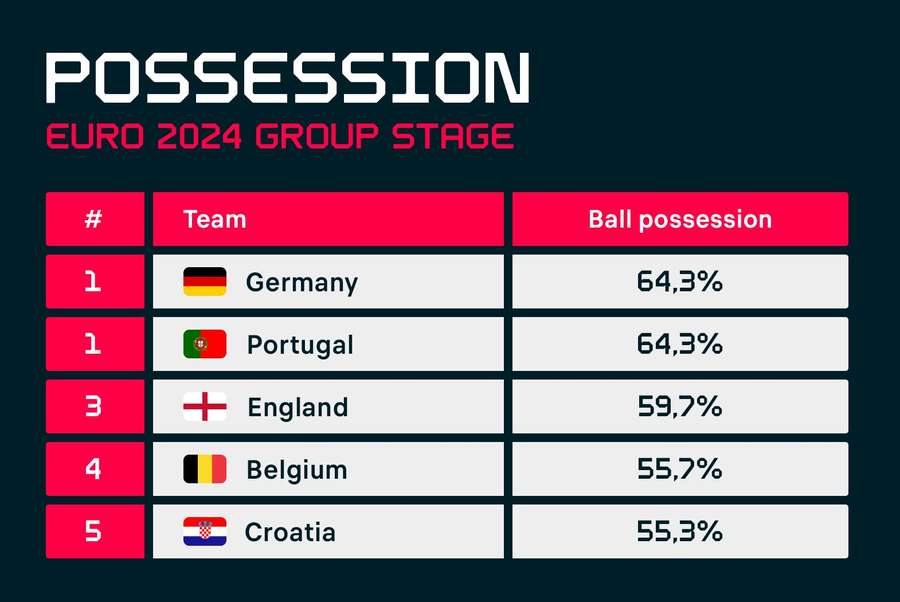
Special mentions
Turkey, Croatia and Romania deserve special mentions.
Let's start with Luka Modric and his teammates who didn't do enough - thanks to a mere matter of twelve seconds, those that separated Italy's late equaliser and the referee's final whistle - to be one of the teams that generated the most in the final third (152 attacks, sixth overall) to progress. There were just two points and three goals for a national team that shot 42 times (eighth), had a passing accuracy of 89.3% (sixth), and kept 55.3% ball possession (fifth) on average.
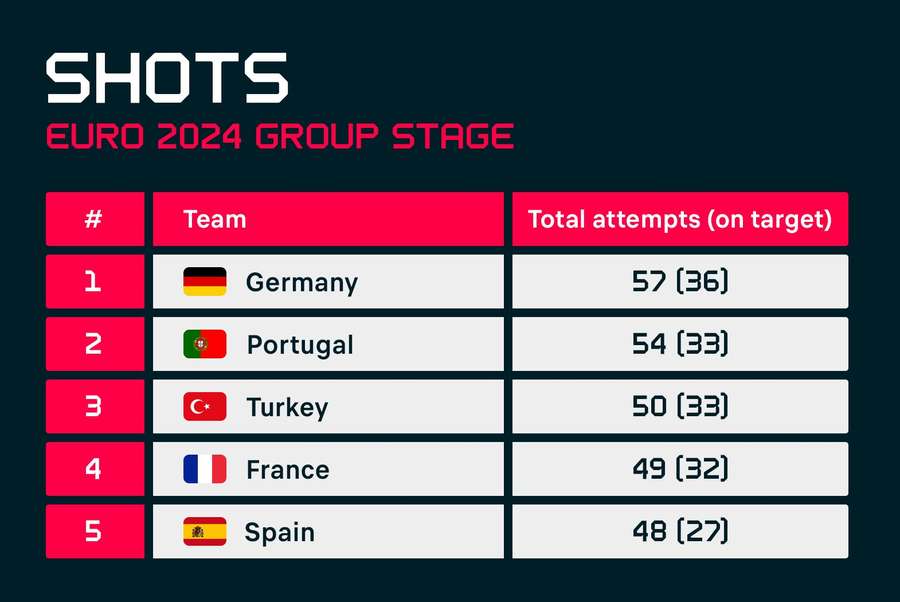
Vincenzo Montella's national team, on the other hand, qualified for the round of 16 by beating the Czech Republic on the final day despite being able to settle for a draw. Hakan Calhanoglu and co's five goals are second only to Austria's six and Germany's eight.
The Turks generated an impressive 161 offensive actions (fifth), amassing 50 total shots (third), maintaining good passing accuracy (88.3 per cent, eighth) and not caring much about maintaining sterile ball possession (52.7 per cent, tenth). In doing so, the Montella boys racked up six points, the same as Portugal and Austria, one less than the hosts and three fewer than Spain.
Finally, Romania aligned themselves with Slovenia's rule of minimal (offensive) effort to reap great, great rewards. They scored twice as many goals as England, Belgium and France despite having taken only 32 shots (19th), being last in terms of passing accuracy (77%), 18th in offensive production (103 attacks) and having barely above 40% average ball possession (41.3%).
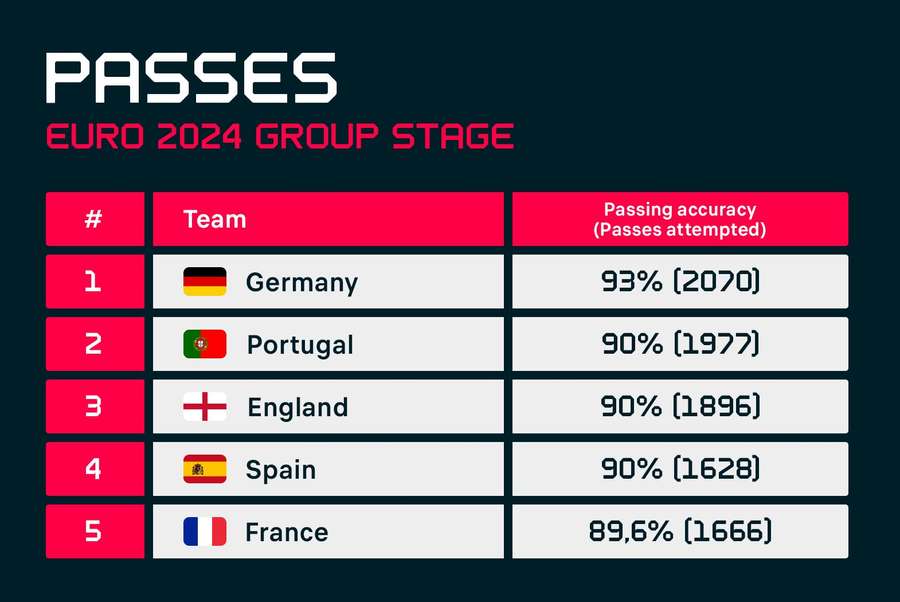
Conclusions
The data of these last three national teams and Slovenia's, along with the fact that the tournament's top scorer so far is Georgian Georges Mikautadze (three goals in as many matches), allow us to come to the conclusion that there is no formula that is most capable of creating a direct connection between offensive efforts and results. This is well known by a quality Croatia side, who were robbed of their survival by Slovenia, who went for the more classic 'first don't take a beating' approach.
Similarly, the cases of Turkey and Romania confirm that there is no single road to glory and that all strategies, good or bad, have the same dignity and generate the same kind of emotions in their fans.
Finally, Georgia's exploits prove that, although football is a team sport, it can be reduced to the exceptional run of form of a single player and the simplicity of the ever-popular maxim that, at the end of the day, you just have to get it in.

